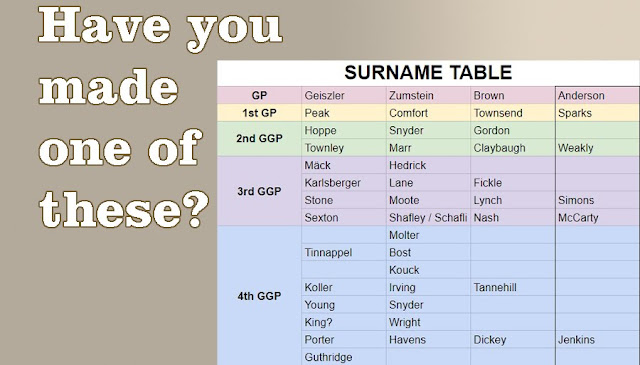Should I Include That? - Family History Writing Tips
After creating numerous heritage scrapbooks, writing the first draft of 120+ ancestor's lives and turning two into published books, I've learned a few things about storytelling.
First, scrapbooks have condensed stories from an ancestor's life. Narratives written in a novella format can have more depth. Register style family histories lack the depth of a narrative and the graphic appeal of scrapbooks.
That discovery aside, sometimes we have an ancestor for which we have mountains of content that could be compiled into a 7-volume biography. But should we write that much about one individual? In short, should I include every detail in a family history?
When writing a narrative history about an ancestor, the goal is to introduce your reader to the individual's life including the familial, community, and world events of the time and place they lived. And it's surprising that having too much information to draw from is often more challenging than too little.
You might face situations like these:
- When writing about an individual's early years, do you include when the babe first sat up, first rolled over, and first walked?
- During the person's youth, they have playmates. Do you include every friend they ever played with? Do you just list them briefly and summarize what games they played? Do you include a few brief examples of the ancestor in question playing a specific game with a specific friend?
- Humans go through a natural changing process during the teenage years. Should you include when the person experienced those changes and their reactions to it?
- What if you have an ancestor that dated extensively? Should you include every relationship or crush? Or can you highlight one or two and sum up that the person "had many crushes and partners"?
- What if your ancestor was involved in sports? Do you write about every training and competitive event they participated in?
The short answer to "Should I Include That?" is really, It Depends!
What are you trying to write?
Let's examine the baby milestones
- If you're writing about an ancestor who overcome delayed physical and mental development or who was an early achiever in life, then the baby details would be interesting.
- If you have a family anecdote, then the milestones could be useful.
- For instance, my grandmother said my mother was born talking, even though mom didn't 'officially' start talking until she was 2.
- I could use this fact and the link it to further stories of my mother getting into trouble at school, work, church, etc for talking too much.
- If you're attempting to write a 60-year biography, perhaps such early stats are best suited for a photo reference to the person who kept a log of such milestones (if you include the details at all).
You can repeat the evaluation process for the other situations I listed, and the ones you encounter. Why are you writing about an ancestor and what are you hoping to accomplish?
- Every human goes through puberty, so mentioning that might not help your ancestor's overall story.
- If you're transcribing their diary, then leave their feelings and impressions in.
- However, if trials in puberty have effects on future life choices, then it's worth mentioning.
- Some ancestors had many love interests and others have less.
- If the numerous relationships are a part of an ongoing social group, then perhaps they can be mentioned.
- However, most family members want the cliff notes versions until the 'how I met your mother' story.
Decisions have to be made by you as the family historian. In making these decisions, don't alter the history of an individual but keep your stories compelling and interesting for your readers.




I came across your blog at Geneabloggers. I really like your thoughts here. Some (personal) things are better left unsaid. However, if you have names of friends or boy/girlfriends, definitely include them. If nothing else, it may provide a clue for another researcher as to where their ancestor was, what type of person they were, etc., especially if you can relate it in a story. You never know ... your published history may be the sledgehammer someone needs to break down a brick wall!
ReplyDeleteJenny... thanks for the thought. I guess I'll have to think about the boyfriend question in a new light. I plan on printing scrapbooks, research books, history books, and potential transcriptions of diaries. Perhaps the printing of the diary would be a great place for those names. Something to think about. Thanks for sharing.
ReplyDeleteHi, per your comment "that when my kids read about their ancestor their interest is not really in who and how many people the ancestor was involved with prior to their marriage"
ReplyDeleteWhen I was younger, and even now, I would have been very interested to know a relative dated more than 1 person before they married. It always seemed to me that for some of these ancestors there was so little of their day to day lives and knowing some of them didn't want to settle for the 1st boy or girl that came along would have been great to know. Just my two cents, and your post also has me thinking about what to do with some of our family secrets. Thanks for sharing.
No problem Jeri. Thanks for the comment. Definitely something to consider. And you're right, the day to day things really do matter and make the family members more real. Thanks for sharing your thoughts.
ReplyDelete